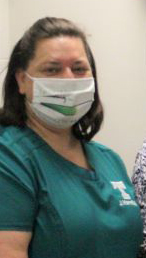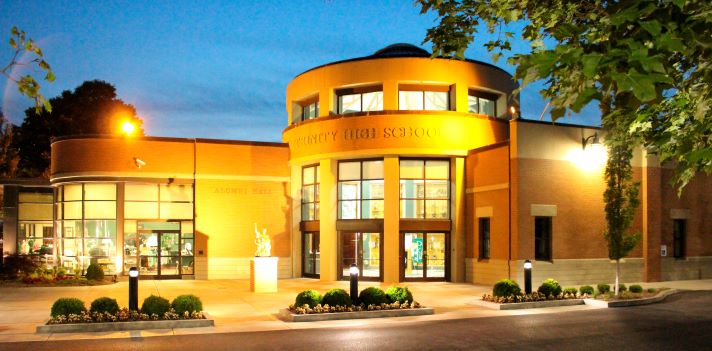Passionate about Caring for the Rocks
April 21, 2021
Mrs. Jacqueline Harrell, RN, works daily to keep everyone on campus safe throughout the COVID-19 pandemic. As Trinity’s contact tracer, nurse Harrell deals with the complexities involved in fighting the virus on a campus that includes as many as 1,500 people. Nurse Harrell answered some questions about her career and her passion for the Trinity community.
Q: What motivated you to come to Trinity?

A: I have admired Trinity and the Brotherhood since I was a little girl walking to Our Lady of Lourdes Grade School from Trinity where my mother was the school guard. I have experienced Trinity as the daughter of an employee, a girlfriend of a student (when I was in high school at Sacred Heart), and as a mother of a current member of the Shamrocks Class of ’21. When we attended orientation for my son, the spirit of family and brotherhood overwhelmed me again, and I just couldn’t wait to find a way to be even more involved.
Q: What made you want to get into the medical field?
A: I have always had a love for babies and children and taking care of people. I started babysitting when I was 11 years old. From there I worked in several day cares and eventually found my way to Kosair Children’s Hospital as a registration clerk/unit secretary in the emergency room. I quickly felt as if this was where I was supposed to be.
Helping children is what made me decide to go to nursing school. While in nursing school, I transferred to the Neonatal Intensive Care Unit. Helping care for premature infants while finishing my nursing degree is where I realized that this was more than a job or career path; it was my calling. After 27 years at Children’s Hospital, I was given the opportunity to help at Trinity, expanding my “patients” to include teenagers as well as premature infants.
Q: How has the pandemic changed your daily work at Trinity?
A: The pandemic has changed my daily work tremendously. Before the pandemic, my daily work was focused on the students — helping take care of administering needed medications, providing first aid, health accommodations, and just being someone to talk to if needed. Since the pandemic, my daily work tends to be much more administrative and involves more interaction with students’ parents — taking parent calls of COVID exposures and illnesses and reporting them to the Health Department.
I provide information and guidance to parents regarding COVID, such as how to treat their ill student, what to expect, how to lower the risks of other family members getting sick, explaining the differences between isolation and quarantine, and providing any support I can.
Q: What has been the most difficult aspect of working during this pandemic?
A: The most difficult aspect of working during this pandemic is grappling with the feeling of always being the “bad guy,” knowing that my job is looking out for the safety of our students, staff, and families, but also knowing that in doing so, people get upset as well. I hurt when others hurt, and there are a lot of people hurting during this pandemic.
Q: What positives have you seen coming out of coping with the pandemic?
A: Positives I have seen come out of coping with the pandemic have been the creativity of doing things differently. There are countless examples of this in our school life, but also in our personal lives. A lot of people have found ways to be able to work from home, hopefully allowing for more flexibility to balance work and family life after the pandemic is over.
I feel that the pandemic has forced us into technology and “screen time” so much, that people are wanting to get away from always being on devices and desire being with each other more than ever before. I hope that positive change remains long after the pandemic.
Q: What advice would you give those thinking about entering the medical field?
A: My advice to anyone thinking of entering the medical field would be to truly assess your reasons for wanting to pursue a medical career. If you are looking at it because the money is good, or you think the hours are flexible, you may want to look at something different.
The medical field is about caring for others; it’s about taking care of people the way you would want to be taken care of. It is not only physically and mentally exhausting, but when done well, it is emotionally exhausting. It is definitely not for the faint of heart, and it is never “just a job.”
Q: What do you enjoy most about working with the students and faculty?
A: What I love most about working with the students is being able to watch their growth and maturity over the course of their four years –entering our doors as boys and exiting as young men — and being able to have a small role in that journey.
Q: What hobbies do enjoy?
A: I enjoy spending time and playing games with my family and friends. Helping my husband with his general aviation projects and flying with him in our airplane. Traveling and reading.
Q: What is your most memorable moment at Trinity?
A: I don’t know that I have a most memorable moment at Trinity. For me, what is most memorable is the opening Mass each year. It always seems to fill me with such excitement and hope — excitement for a new class of young men entering our family, and hope for the senior class that will be forging their way into adulthood.
Q: What do you love about Trinity?
A: What I love about Trinity is not going to sound original, but I think that’s because of how profoundly true it is. What I love about Trinity is the sense of Brotherhood and family and how inclusive Trinity is. Everyone is a brother/family. It is unlike anything I have experienced. I am grateful and humbled to be considered a member.


